The Cornish Pasty |
This page about French and Breton pasties has been difficult to write because of linguistic ambiguities considering French, Breton and English translation, keeping in mind also the influences of Old English and Old French on the languages
Pâté generally translates as 'pie' and pâte as 'paste'. The â (a-circumflex) in French generally means that the letter 's' has been lost from older spellings
In Old English, paste means 'pastry' or 'dough/flour mixture' whereas pastry in modern terms translates back into French as 'patisserie'
Then comes more fun - pasty can translate as 'pâté en croûte' where en croûte means 'in a crust'. Therefore, 'pâté en croûte' means 'pie in a crust' ..... a pasty .....
'Tourte' also means a pie, but is perhaps closer to 'tart' in English .....
Pâté in today's parlance also commonly means a 'meat paste' or 'spread' .....
Then, there is the Old French/Breton word, pastez ..... below
My good friend and fellow Pasty Antiquarian, Mr Henry 'Oggie' Trelissick, was in France this June (2007) and brought back a newspaper cutting:
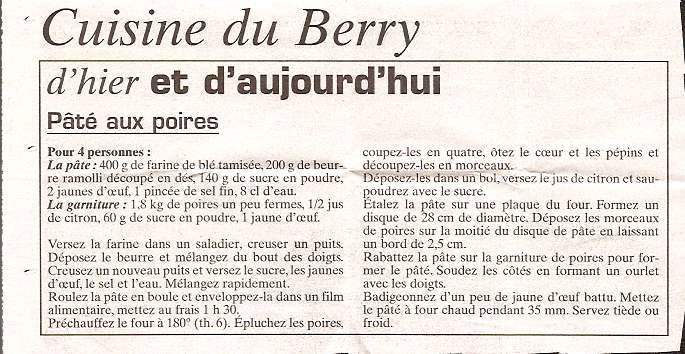
In this article, pâté = pasty, pâte = pastry. These normally translate as "paste" and "pie" respectively (as indicated above) but the method of putting the filling on half of the pastry, folding and crimping is absolutely the way of making a pasty
Translation, by courtesy of Mr Henry 'Oggie' Trelissick .....
| Berry cuisine | ||
| Yesterday and today | ||
| Pear pasty | ||
|
For 4 people: Sift the flour into a bowl, make a well. Rub in the softened butter. Make a new well and addthe sugar, egg yolks, salt and water. Mix quickly. Form the pastryinto a ball and wrap it in cling film. Leave in a cool placefor 1 h 30. Preheat the oven to 180° (Reg.6). Peel the pears,
|
cut them in four, remove the core and the pips, cut them into pieces. Put them in a bowl, add the lemon juice and dust them with sugar. Roll out the pastry on a baking sheet into a circle 28cm in diameter. Pile the pieces of pear on one half of the pastry circle leaving a2.5 cm margin. Form the pasty by folding the pastry over the pear filling. Seal the edges by forming a hem with the fingers. Glaze with a little beaten egg yolk. Put the pasty in the hot oven for 35 min. Serve warm or cold. |
'Seal the edges by forming a hem with the fingers' - this means crimp the crust!
The Berry is is a medieval Dukedom in the centre of France, a little like Wessex in England. It has a lot of history. Placed where it is, it was badly treated by both sides in the North/South rivalry in early France. Julius Caesar also dealt harshly with the inhabitants as an example to the other Gauls who called themselves Celts
Berrichon is a local (male) inhabitant or the (pretty impenetrable) dialect/patois; berrichonne refers to a female local or the cooking style, e.g 'Flan a la berrichonne'
Another Celtic connection
Here is something from a French / Breton online dictionary .....
Dictionnaire breton-français de Le Gonidec .............
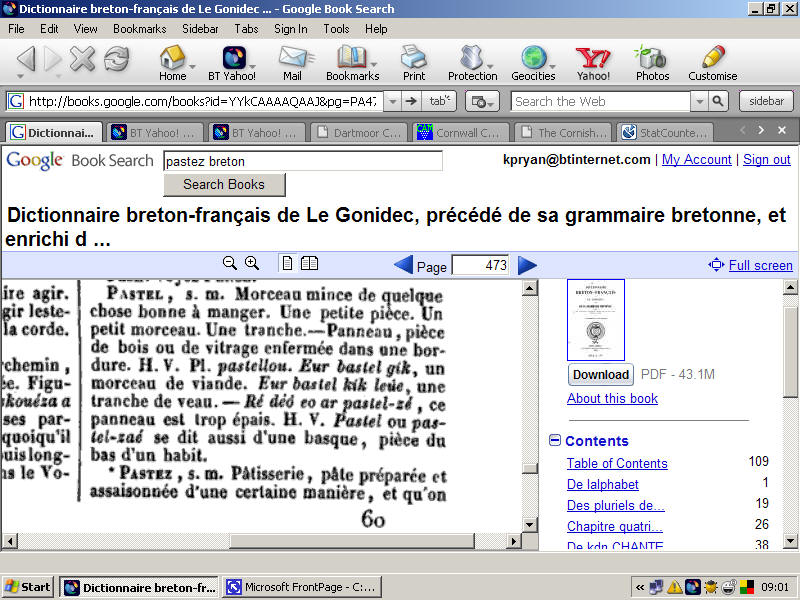
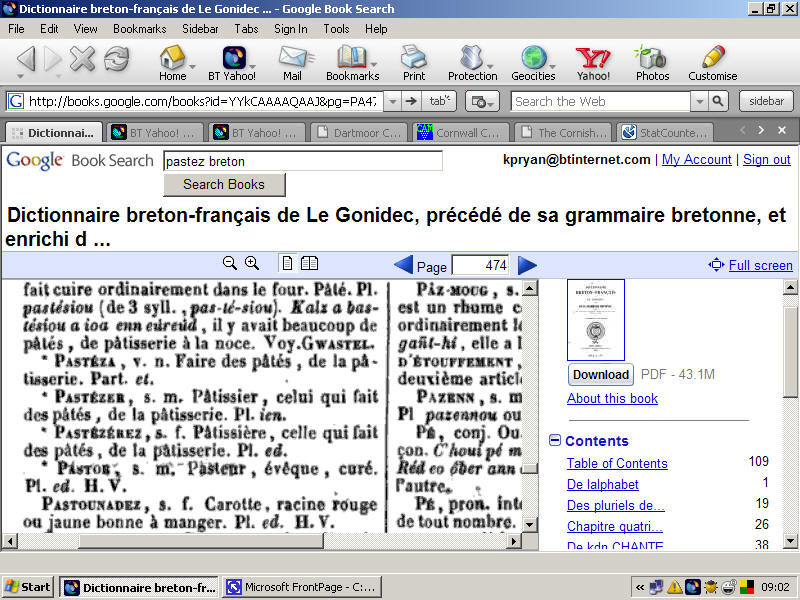
dans le fours = in the furnace/oven
It shows Pastez (in Breton) as meaning 'patisserie, pâte ....' which we see from above can mean 'pastry, paste ' where paste can be meat paste or minced meat
In other words, a pastry covered pie baked in the oven = pasty
Here is another linguistic exercise shown online .....
| http://xroads.virginia.edu/~hyper/Adams_Mont/ch02.html | |
| Entor le mont el bois follu Cil travetier unt tres tendu Rues unt fait par les chemins. Plentei i out de divers vins Pain e pastez fruit e poissons Oisels obleies veneisons De totes parz aveit a vendre Assez en out qui ad que tendre. |
About the Mount, in the leafy wood, The workmen have tents set up; Streets have made along the roads. Plenty there was of divers wines, Bread and pasties, fruit and fish, Birds, cakes, venison, Everywhere there was for sale. Enough he had who has the means to pay. |
Pain et pastez = bread AND pasties
http://www.csc.liv.ac.uk/~azaroth/papers/transcript.pdf page 172
Comment le roy d'Engleterre trouva passage de la riviere de Somme.
A pres ceste ordonnance le roy Phelippe, qui durement desiroit a trouver les Englois
et eulx combatre, se party d'Amiens a tout son effort et chevauca vers Araines et vint la
a heure de midi ou environ. Et le roy d'Engleterre s'en estoit parpty a petite prime. Et
encore trouverent les Francois des pourveances, chairs en hastiers, pains et pastez en fours,
vins en tonneaux et en barils et moult de tables mises que les Englois avoient lessies car ilz
s'estoient de la parpty en grant haste. Si tost que le roy de France fu venuz a Araines, on
lui dist, "Sire, logies vous et attendez vostre baronnie. Il est vray que les Englois ne vous
peuent eschapper." Dont se loga le roy en la ville et tout ainsi comme les seigneurs venoient
ilz se logoient.
OGGIE'S LEARNÉD TRANSLATION ............
How the King of England crossed the river Somme
After this ceremony, King Phillip, who seriously desired to find the English and fight them left Amiens as fast as he could and rode towards Araines and came there at midday or thereabouts. And the King of England had left there at Prime. And the French found provisions still there; meat in [cauldrons], loaves and pasties in ovens wines in tuns and barrels and lots of tables set that the English had left since they had departed in great haste. As soon as the King of France had arrived at Araines they told him "Sire, lodgings await you and your barons. It is true that the English cannot escape" Therefore, the King settled down in the town and as his lords arrived, they settled in too.
Other links
http://www.blog-appetit.com/t/chausson/ with links to several chaussons
Chausson = 'slipper' - or a turnover that looks like a pasty
As can be seen in two photos below, these can be sealed by pressing the edges of the pastry together with a fork, in which case they are best considered perhaps as 'turnovers'. However, when the edges are crimped together like a pasty then they look like a pasty to me (see the right-hand photo below) .....
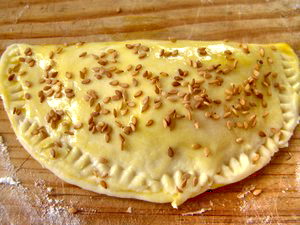 Source: http://cuminetcannelle2.canalblog.com/archives/ 2006/12/12/3411801.html - seems to no longer work |
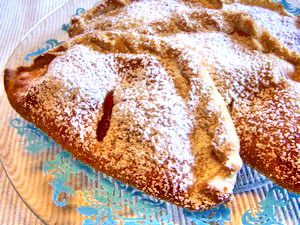 Source: http://www.plat-du-jour.net/chausson-aux-abricots.html - seems to no longer work *** NOTE THE CRIMPING *** |
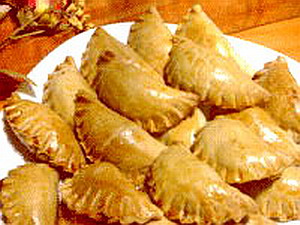
Source:
http://www.lejus.com/entree_52.html
Some links stop working
when web sites are changed
although the items can usually be searched for using Google
There is too much work involved inconstantly chasing this problem!
http://www.plat-du-jour.net/chausson-aux-abricots.html - seems to no longer work
http://www.plat-du-jour.net/chausson-a-la-viande.html - MEAT! - seems to no longer work
http://www.lejus.com/entree_52.html
Also - 'pastez' can mean a particular (pasty-shaped) loaf of bread today .....
boulangerieleborgne.com (now a broken link?)
"Le Pastez : une brioche aux raisins ou aux pruneaux à la recette bien gardée.
Le pastez ou pastès est une brioche typique à notre secteur et qui était surtout dégustée pour le Mardi-Gras.
Vous pourrez le déguster pour vos goûters et vos petits déjeuners ou pourquoi pas pour vos petits creux.
Source: http://www.boulangerieleborgne.com/ "
And, from a French/Breton discussion forum, the word 'pastez' features .....
.................... Merci,
donc, si j'ai bien compris cela se traduit comme ça:
paté breton ou paté de campagne breton (memes tra) :
"Fourmaj-kig Breizh"
ou pour une version plus "roots" rajouter "gros", pour un bon vieux paté de derrière les fagots!
le même au poivre vert:
Fourmaj-kig Breizh gand pebr glas
Merci de me le signaler si je n'ai pas bien compris, je ne parle pas le breton mais comprends certains mots.
Merci braz pour ces traductions. Je t'envoie un pâté numérique en retour...
Vous pouvez aussi utliser "pastez":
Pastez mod Breizh / Pastez e-giz Breizh (breton)
Pastez diwar ar maez (de campagne)
Pastez gant pebr glas (au poivre vert)
From the above, it is clear that 'pastez' is a Breton word that can also mean 'pie', as can 'pâté', so that the French 'paté breton' can translate to the Breton 'Pastez mod Breizh / Pastez e-giz Breizh' etc.
Words evolve and change meaning down the ages and this can cause confusion .....
But - anything that looks like a pasty and is made like a pasty and is baked like a pasty, is a pasty!
Assez de French pasties .....
